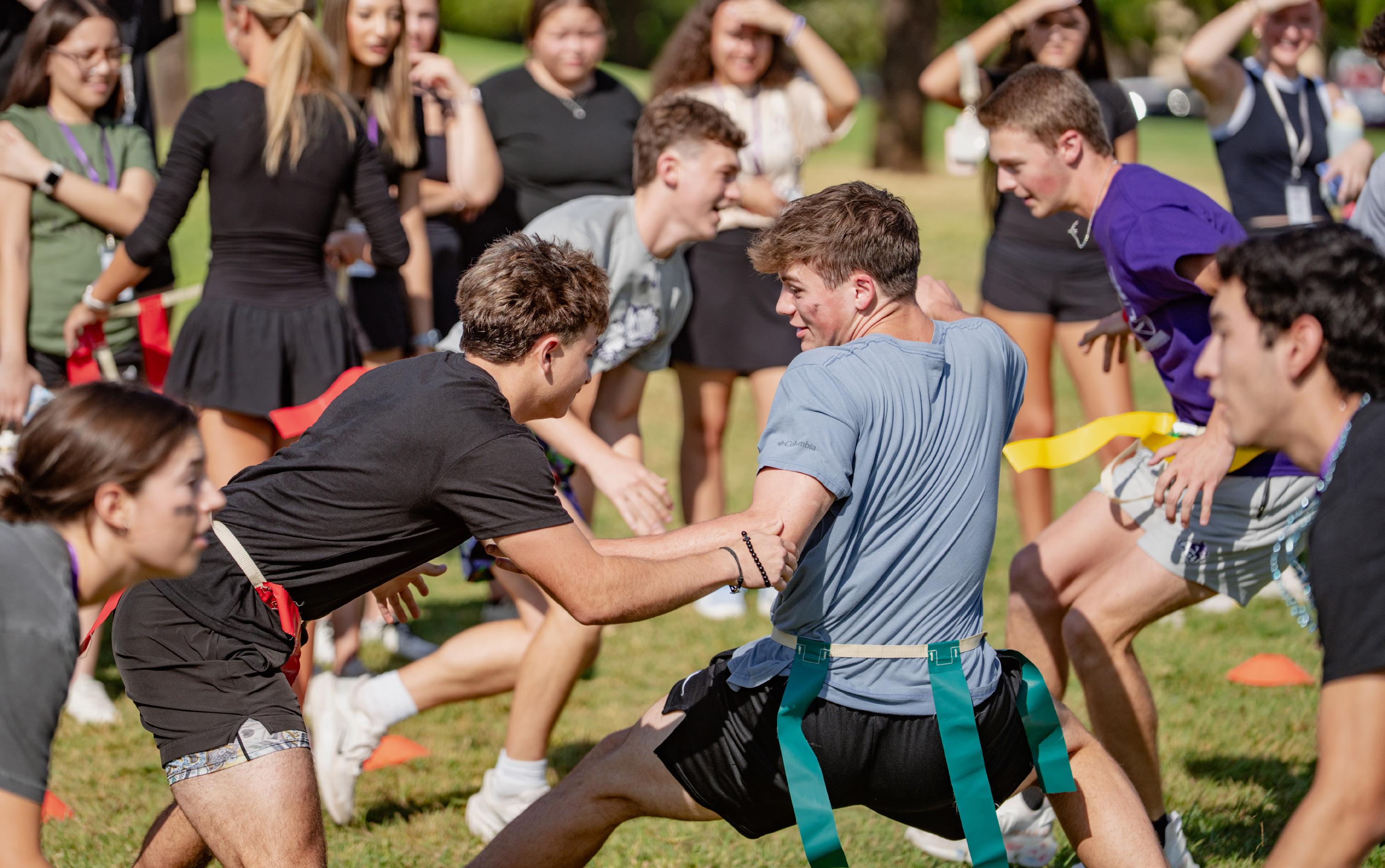

Opening Assembly to commence 120th academic year
BY MAKAYLA CLAYTON COMMENTARY EDITOR
The 120th school year will officially begin with the traditional Opening Assembly in Moody Coliseum on Monday. This year the annual flag ceremony will feature more than 100 flags representing the countries, U.S. states and territories of students and faculty.
This year’s featured
speaker will be Mike Cope, who is the director of ministry outreach at Pepperdine University. For 18 years he preached at Highland Church of Christ in Abilene. “Mike is one of the most gifted orators that I have heard in my life,” said Dr. Ryan Richardson, vice president for student life. “I’m deeply excited about our students being able to hear
from him because we have traditions that we do each year as part of Opening Assembly, and he is going to latch on to those traditions and continue to amplify the work of God in this place.”
For the second year in a row, the Navajo Nation will be represented in the flag ceremony, said Craig Fisher, associate vice president for advancement and alumni.
He said organizers are in the process of obtaining a flag to represent a student from the Choctaw Nation this year. If they are unable to find one, he said the university will acknowledge that student and the Choctaw Nation another way. Another tradition the Opening Assembly will continue to follow is the devotional, a practice that has
marked the start of every academic year since the university’s founding in 1906. The hymn All Hail the Power of Jesus ’ Name will be the first song sung, and Paul’s sermon on Mars Hill will be read. For many students, this assembly will be the first time they hear the Big Purple Band and Grand Chorus perform and
Spiritual Life decreases Chapel credit requirements
BY ASHLEY HENDERSON EDITOR IN CHIEF
Students will no longer be required to meet the 500 Chapel credits requirement for the upcoming year, according to recent updates from the Office of Spiritual Life, but will have attendance requirements based on their year on campus.
Campus minister Avory Rosenhuff said the spiritual formation requirement had not been changed since 2003. Since the world and expectations for students have changed since then, she said she and campus minister Nathan Kranz saw a need to reflect on the requirement.
“We want to give the autonomy as students get older, to be spiritually formed in ways outside of our system,” Rosenhuff said. “We believed that a 500-point credit was hindering that, and also there was an over-
New Kojie
BY LESLIE CARRIGAN MANAGING EDITOR
Construction on the new Kojie Park is nearing completion as the Women of Ko Jo Kai plans a park dedication on Homecoming weekend.
The park cost around $600,000. The idea first emerged after Homecoming 2022, when the GATA fountain was completed, said Erin Wessel, a Ko Jo Kai alumna. Wessel is one of the four members of the committee in charge of the park’s construction. It was primarily funded by alum-
saturation of what credit was and it being used as an incentive all the time.”
Rosenhuff said the Spiritual Life wanted to be in step with the university’s integrated spiritual formation plan, which allows spiritual formation to be embedded into campus.
Chapel requirements now fit into a tiered system based on how many years a student has been at ACU, not their classification. The tiers are:
Year One: 400 points per semester, averaging three events per week
Year Two: 350 points per semester, averaging three events per week
Year Three: 300 points per semester, averaging two events per week
Year Four: 250 points per semester, averaging two events per week
“Everyone was trying to get to this 500, and that totally defeats the purpose of why our office exists,” Rosenhuff said. “We exist
because, as ACU, we value spiritual formation. So we are going to provide spaces for that, and we want it to be a natural rhythm.”
The weekly Chapel schedule will also change with Moody Chapel on Monday, small group Chapels from Tuesday-Thursday and Friday on Praise Day. Rosenhuff said this schedule encourages people to have more balance and get involved in small groups.
“You don’t have to go to Moody every day,” Rosenhuff said, “so your 11 o’clock hour, we hope, can be used for multiple things, not just Chapel credit, but professional development, study in the library like and you get to kind of pick what day is what.”
Katelyn Faske, sophomore kinesiology major from Grapevine, said the new Chapel requirement will be helpful for her.
“I can make sure that I’m getting stuff done still and not have to worry about Chapel
a lot,” Faske said. “Sometimes I don’t scan in, and it affects my numbers because it’s not that I don’t go, I just don’t always scan.” Bre Richardson, junior multimedia major from Canyon Lake, said she is excited for the change, but she wishes the 500-credit requirement stayed the same for freshmen.
“Your life does get busier every year, so it’s good that there is less of a requirement every year,” Richardson said.
“I wish it had stayed at 500 for the semester, selfishly, because I do think that it is good for you to be going a lot. It really helped me freshman year to have to go that often. But at the same time, that is a lot, so I see why they lowered it.”
Students will still be allowed to apply for Chapel exemptions for reasons such as working or extracurriculars. However, the updated system is designed
to accommodate the typical reasons for exemption, such as living off campus.
Rosenhuff said she hopes students will feel an overall sense of relief, and that it will create quality engagement versus quantity engagement.
“No matter what year you are,” Rosenhuff said, “if you go to two or three events for the first two years and two events for the next two years, you will finish early. It is a natural part of your week. Come to Moody once or twice a week, find one small group, not five, that you need to be a part of, and you will finish. So we just think that that reflects spiritual formation more appropriately.”
In other changes, Rosenhuff said Mace Ratliff, the previous coordinator of Chapel production, is no longer with the university. She said Peyton Deffenbaugh will serve as the worship production coordinator.
Park set to finish construction by Homecoming
nae who hope to increase the sorority’s involvement on campus.
“We were so thankful to previous classes that [built] the original Kojie Park,” Wessel said. “But we knew that to increase our presence on campus and to give back to previous classes and future generations of Kojies that we also wanted to increase our footprint on campus.”
On the Saturday of Homecoming weekend, the club plans to host a dedication and breakfast at the park, which will feature alumnae speakers. The new park contains
a variety of references to club history and traditions, including the number 13, pledge pins, squirrel statues and an engraving of the club’s motto, “Encouraging higher aims among girls through the binding ties of friendship and love.”
Ko Jo Kai was established in 1913 and currently has a park outside Moody Colliseum. The park had a large engraved crest in the middle, which has already been removed to be put in the new park.
Once the park is built, it will serve as a meeting location for the club and will

play a significant role in new member orientation, said Makeda Marquardt, Ko Jo Kai president.
“I’m really excited to figure out how we’re going to take all of our traditions and
start them at the park,” said Marquardt, senior accounting major from Abilene. “I think for campus, too, it’s just going to be another place where you can sit outside and you can hang out with friends.”
sing The Lord Bless You and Keep You , another long-time tradition.
“I am most excited about students, faculty and staff being reminded that this is a place they belong,” Richardson said. “We acknowledge the place you call home, the place where you were born and raised, and that place has space here in Abilene.”



A student publication of Abilene Christian University since 1912
BY DANIEL CURD | CHIEF PHOTOGRAPHER
Ben Porter, freshman management major from Argyle, dodges an attack during a game of flag tag during the annual Mentor Group Olympics.
PHOTO BY DANIEL CURD Construction continues on the new Kojie park.
Study Abroad forced to drop inaugural Valencia trips
BY LESLIE CARRIGAN MANAGING EDITOR
Study abroad trips to Valencia, Spain, for the fall and spring semesters were canceled on June 15 after a partner university in Spain cut half of the classes offered for students.
The Office of International Programs and Study Abroad partnered with the Polytechnic University of Valencia, which provided the courses during the trips; however, in March, public university elections were held, said Mark Barneche, the executive director for international education and study abroad. Following these elections, the new UPV leadership decided to cancel half of the classes that were offered to ACU students.
“In sort of late May, early June, making a transition to offer all of the courses that we
were offering by some other means, it was too late to really transition effectively,” Barneche said. “That was the big challenge that led ultimately to the decision to postpone.”
This fall, 17 students were signed up to go to Valencia, after the trip was canceled, students were given a week to decide whether to go on another study abroad trip to Oxford, England, or Leipzig, Germany, or to stay in Abilene, where Residence Life and the students' academic advisors were already aware of the situation and prepared to help students transition. Nine students chose to go on other trips, and eight decided to stay in Abilene.
Emma Mejia, a junior social work major from Canton, who was supposed to study abroad this fall, said the
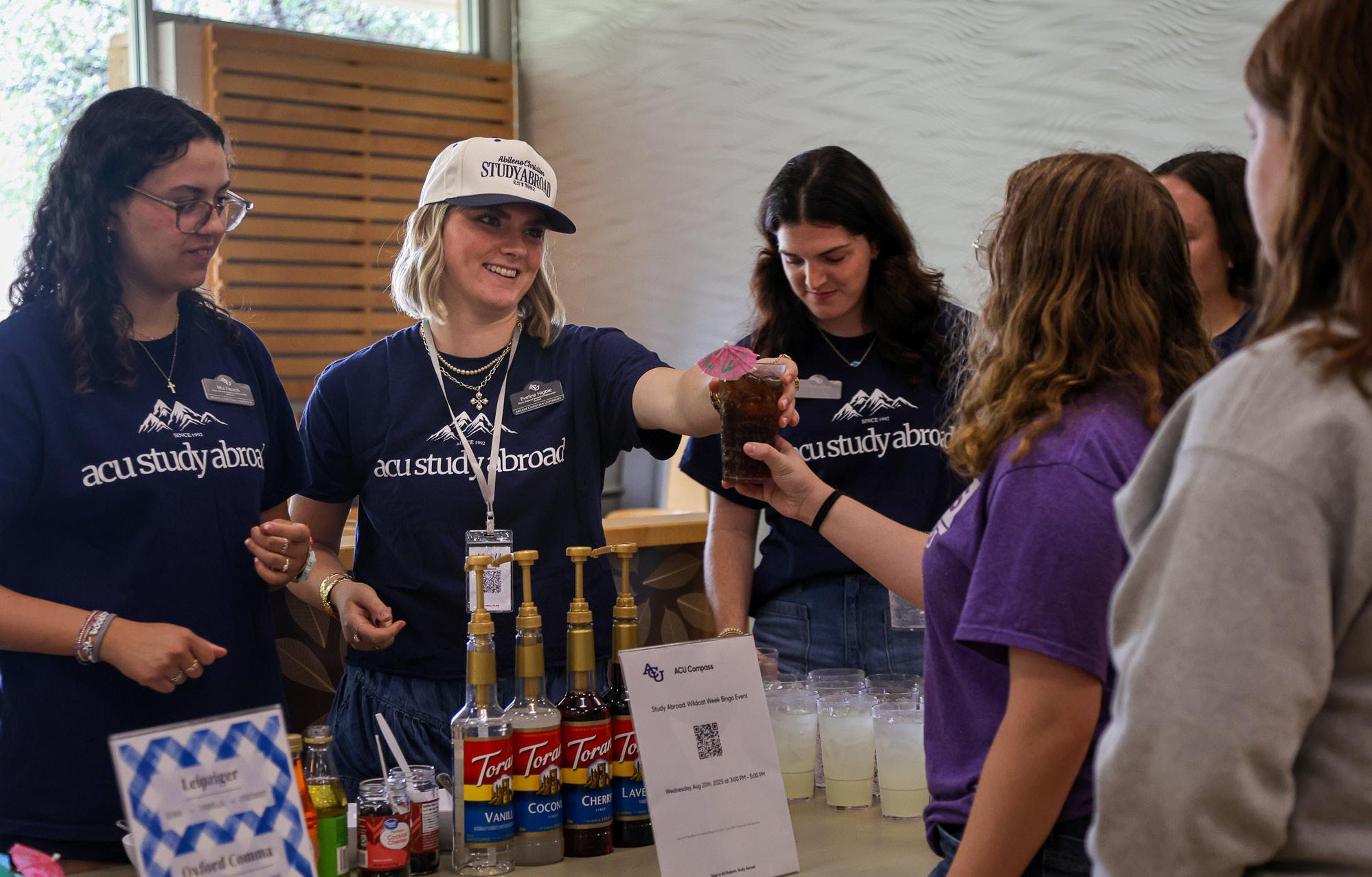
housing process was hectic despite ResLife’s attempts to help the students. As a result, she was placed in sophomore housing. “I didn’t have plans for
this fall, so that was the most nerve-wracking thing,” Mejia said. “Eventually, they were
like, ‘Smith-Adams is the only place we have.’”
Although the trips to Spain this year are not happening, study abroad still wants to provide students the opportunity to live in a Spanish-speaking country, Barneche said.
“We’re planning on offering programs in Valencia in summer 2026 and launching full semester programs in the fall of 2026,” Barneche said. “But what we were able to do in the last year was establish our legal entity in Spain: banking accounts, tax compliance, rural services and so we are able to fully employ people.”
The current application cycle includes spring 2026, summer 2026, fall 2026 and spring 2027. The priority deadline is Oct. 1 and the final deadline is Nov. 1.
UP residents raise questions about issues with housing contracts
BY CALLIE LEVERETT NEWSLETTER EDITOR
University Park residents are calling attention to discrepancies between housing contracts and charges to their accounts. The residents said Residence Life is refunding only the few students who caught and protested the issue.
The UP Efficiency Apartment housing is listed for $3,900 per semester.
Brooke Benson, senior communication disorders major from Midland, said the initial contract she received via email listed the rate at $3,850--but the charge to her account was $3,900.
“They did increase the price a little bit over the year,” Benson said, “but there is still a $50 difference from the price that I was assigned and the price I signed for.”
Benson emailed ResLife highlighting the difference. She said ResLife dismissed her concerns, saying she
agreed to the charge when she signed the contract.
“It kind of felt like gaslighting,” Benson said. A friend of Benson’s, Brylie Mahar, also noticed the price difference from the contract. Mahar, a graduate student of Speech-Language Pathology from Savor, said when she realized, she reached out to ResLife via phone call and email.
After Mahar emailed ResLife, she said the reply had that familiar dismissing tone.
“They eventually got back with me, and they were saying that that’s just kind of how it is and that they weren’t gonna change it,” Mahar said. Mahar said she sent a few more emails, restating the issue, but they weren’t budging.
“That’s when I went to Shannon Kaczmarek,” Mahar said, “basically telling her that I’m going straight to her now because no one was answering the phone, and it was taking a long time to get
Students cite housing struggles after The Arch rebrands
BY MAKAYLA CLAYTON COMMENTARY EDITOR
One of the main apartment complexes that houses university students, The Arch, changed management companies and owners over the summer. The Arch was rebranded as The Grand at Buffalo Run. Residents say the change in management has created communication issues regarding move in.
Front desk officials at The Grand said a new manager was hired to begin on Aug. 20. She did not respond to a request for an interview.
Maya Padilla, senior theatre major from Fort Worth, is working as a Wildcat Week leader. She reached out to The Grand in May, asking if she could move in a week early. She was told she could, but when move-in time approached, she could no longer get a hold of the front office.
“They weren’t responding to my emails or calls,” Padilla said. “I called them every day for almost two weeks. It had basically become a daily routine.” It wasn’t until the day before she was supposed to move in that the leasing office responded to her, letting her know when she could move in. But her problems did
not stop.
She said the maintenance team took two days to get back to her about the condition of her apartment, and when she moved in, the space was not clean.
Padilla said there was built-up grime on the air conditioning, and multiple odorous trash bags outside her door.
The rebranding has racked up multiple onestar Google reviews, with residents expressing similar frustrations with the lack of communication in the leasing office.
Joshua Loughren wrote, “The office is closed for hours at a time in the middle of the day. I have waited my entire lunch break, multiple days now, just for no one to show up and the office to still be closed.”
Claire Cash wrote a review explaining a similar problem.
“New management won’t fix my key,” Cash said. “I haven’t had access to my apartment for a full week, while the office closes when they aren’t supposed to with no notice.”
The leasing office told Padilla that during the change in management, The Grand lost access to its residential system and was operating on paper, which has been the reason for the issues.
a response on email.”
Mahar said she felt heard by Shannon Kaczmarek, the Dean of Community Living and Wellness.
“Shannon was the only one who took me seriously, immediately listened to my concerns, found a solution and solved it within the day,” Mahar said.
Benson didn’t receive the brushoff ‘it’s-in-thecontract’ email from ResLife until after Mahar’s issue was resolved.
“They were really blunt,” Benson said, “and not even taking it seriously.”
Benson stayed strong; she said she emailed them restating that there was still a $50 difference and added that Mahar had the same issue resolved.
“And like 10 minutes later, I got an email back saying like, ‘Oh we’re so sorry about that! We changed it,’” Benson said.
The charge on her account was fixed to match

the price in her contract but only after her long series of emails.
Mahar said she knows other students who picked up on the issue but are hesitant to fight for it.
“There’s some people that are just accepting that they’re paying more than what their contract signed rather than just fight the difference,” Mahar said.
While navigating resident-reported disconnects, ongoing email exchanges and the move-in process, ResLife is also in the midst of searching for a new director for UP.
“The old UP director stepped down from her position at the beginning of the summer, I believe,” Mahar said. “They hired a new woman... and she ended up quitting the day of move-in.”
Kaczmarek released information in an email on the stepping down of the new director of UP, Phebe Dowels, and asked for thoughts and prayers for her. According to Kaczmarek’s email: “Bellande Bertrand, our director of residence life will be stepping in to help with UP until we hire and train Phebe’s replacement.”

(PHOTO COURTESY OF MACKENZIE TINDALL)
Study abroad ambassadors Mia Farach, Evelina Higbie and Gracen Davis pass out sodas to the new Wildcats during Bingo in the Bean.
Campus community impacted by July flooding
BY LESLIE
At around 5 a.m. Dr. Kyle Tippens awoke to the power turning off in the house. His noise machine went silent and his fan slowed to a stop. Outside, thunder crashed and rain battered the window. On the morning of July 4, he missed the alerts on his phone warning him of the flooding happening just a few hundred feet from his house.
“I called the property manager at 8 in the morning, trying to figure out how to reset the breaker,” said Tippens, associate professor of finance, . “[He] said ‘hey, let me help you with this breaker but just so you know this is a big deal there’s a lot going on. They’re pulling people out of the river doing water rescues.’”
Over 200 miles away from Kerr County and weeks after the events on July 4, the ACU community continues to feel the impact of the Hill Country flooding this summer.
Late on July 3, the National Weather Service began issuing severe weather warnings. Flash flooding fueled by 10 to 12 inches

of rain in just a few hours. caused the Guadalupe River to rise over 21 feet in under an hour, according to an article by the New York Times. In the flooding, 135 individuals lost their lives.
Brooks Burrows, senior psychology major from Kerrville, spent the first part of her summer working as a counselor at Camp Mystic, which was destroyed in the tragic flooding that took the lives of 28 campers, counselors, and staff lost their
lives. She had been home from camp for just three days when the storm hit.
“I grew up on the river,” Burrows said, “and I grew up almost every single summer going with my family, spending days on the river, kayaking and paddle boarding. And just driving through town and seeing everything not there, destroyed. There were kayaks in trees. There were tarps everywhere, cars were demolished. It was just crazy.”
Amid the tragedy in Kerrville, the community came together to help provide food, supplies and shelter to those impacted and to help clean up, Burrows said.
“When school started back, at Walmart they were giving out free school supplies, free backpacks,” Burrows said. “A lot of big buildings opened up their spaces so people could stay there and a lot of different people outside the community donated resources.”
NEXT Lab nets $120 million in Texas funding
BY ASHLEY HENDERSON EDITOR IN CHIEF
The Texas Legislature allocated $120 million during its spring legislative session to the construction of the NEXT Lab’s molten salt research reactor, which will be called the Natura MSR-1. The funds were allocated to Texas Tech University, which joins the university’s partnership with Natura Resources and the Texas Produced Water Consortium (TxPWC). Dr. Phil Schubert, president of the university, said the project gained momentum with the state legislators and its partnership with Texas Tech, Natura and TxPWC.
Schubert said state Sen. Charles Perry, Rep. Stan Lambert and Rep. Drew Darby provides significant support during the legislative session.
“ACU, along with our partners, is positioned to become a national leader in advanced nuclear training and research, setting a global standard for clean energy and medical advancements,” Schubert said. The Natura MSR-1 will be constructed within the Dillard Science and Engineering Research Center, which opened in September 2023. The Nuclear Regulatory Commission (NRC) issued the university a construction permit last year, giving the NEXT Lab approval to build the MSR-1. Schubert said the university has spent the last year working to complete all design and construction document work.
“You think about it as architects kind of put together a house plan, and then you turn that into an actual construction document pack-
age,” Schubert said, “which is really kind of what we are doing – moving it from the higher level design to the more specifically construction-oriented design.”
Dr. Rusty Towell, NEXT Lab director and professor of physics, said the university has made significant progress in the past year.
“The operating license is in the review process now, and the plan is to submit it this year,” Towell said. “The detailed design has been finished. We secured $120 million from the state of Texas for the project, and the Department of Energy has selected this project to be part of their pilot reactor project program.”
Success for the MSR-1 could lead to the construction of similar molten salt reactors, which will be used commercially.
According to the press
Tippens was on a family vacation in Ingram along the Guadalupe River when the river flooded. His family was physically unharmed by the events but were stranded without electricity or running water in their VRBO until Saturday because the river rose above Cade Loop Bridge, the only road out of the neighborhood.
He said he did not understand the full scope of the damage until around 1:30 p.m. on Friday, when the Tippens family went down to see the river.
“There was debris all the way up really high on the road that we had crossed,” said Tippens.
“We all went back to the house and were silent for a while. Nobody really said anything, and we were just realizing that we probably weren’t going to get out of there for a long time.”
Much like Burrows, Tippens watched as strangers came together to support one another. They met with the people in the surrounding houses and shared food.
“We were really wondering what was going to happen, like how many
days were we going to be there without power and water and food?” he said.
“They were sharing food with us and everybody was just trying to look out for each other. But we were all stuck for about 36 hours.”
On July 5, an earth mover came and cleared debris from the bridge so the Tippens family could return home to Abilene. Once they left, they began to learn more about the destruction left by the flood.
“Some of us really struggled with getting back into the swing of things,” Tippens said. “After seeing the water the way it was, it's not hard to imagine how destructive it was.”
As cleanup continues, weeks after the flood, Burrows is grateful for the way the community is still working to help recover from the tragedy.
“I've seen good and bad come out of this situation,” Burrows said. For example,
“Seeing the community come together and people outside of the community provide their help and seeing everyone come to town just to support us.”

release, the goals of the project are:
Water Security. Reclaiming and purifying produced water supports longterm water sustainability in drought-prone regions.
Clean Energy Innovation. The deployment of molten salt reactor technology in Texas advances a new era of safe, efficient and carbon-free power generation.
Global Health Impact. The reactor’s ability to produce vital medical isotopes helps address critical global shortages, enhancing cancer care and diagnostic medicine worldwide.
Towell said the university wants to provide global solutions and be a blessing to the world.

“Whether it’s the energy you need to raise people out of poverty, or whether it’s medical isotopes to diagnose and treat cancer, we’re trying to meet the needs of the world,” he said.
Schubert said the university does not want to conduct research for research’s sake but to have its research help answer some of the biggest questions humanity faces, such as water security. The MSR-1 will desalinate, or remove salts and other minerals from water, allowing it to be used for human consumption, irrigation or industrial uses.
“Water is actually a very constrained resource, not just here in Texas, but really across the country," he said.
"So figuring out how to desalinate that water in large quantities would be a major benefit to the state of Texas.”
One of the project’s greatest challenges is the lack of available energy on the Texas grid to run operations.
“One of the big questions is, ‘What are we going to do to provide the energy that our economy is going to demand moving forward?’” Schubert said.
“I think nuclear is the only

answer for that.”
As the university moves through each phase of the project, an important part of the process includes educating the community, especially on the project’s safety, Towell said. He added addressing safety concerns can be a challenge, but he loves the opportunity to do it.
“That’s a key question of the university,” Towell said, “‘Can we do this safely for us and for our students, for our neighbors?’ and the answer is yes. That’s the same question the NRC answered, and the same question investors answered, the same questions the state of Texas wanted answered before they invested $120 million in the project. So all of these people are concerned with safety, and I’m glad people ask the question.”
The university hopes the MSR-1 will begin operation in 2027.


PHOTO COURTESY OF DR. KYLE TIPPENS
The Tippens family and other Ingram residents look at the flood damage on Cade Loop Bridge.
PHOTO CURTESY OF ACU Jackson Shoultz, NEXT Lab research chemist, works in the Dillard SERC.
REACH FOR THE STARS
Meet members of the class of 2029





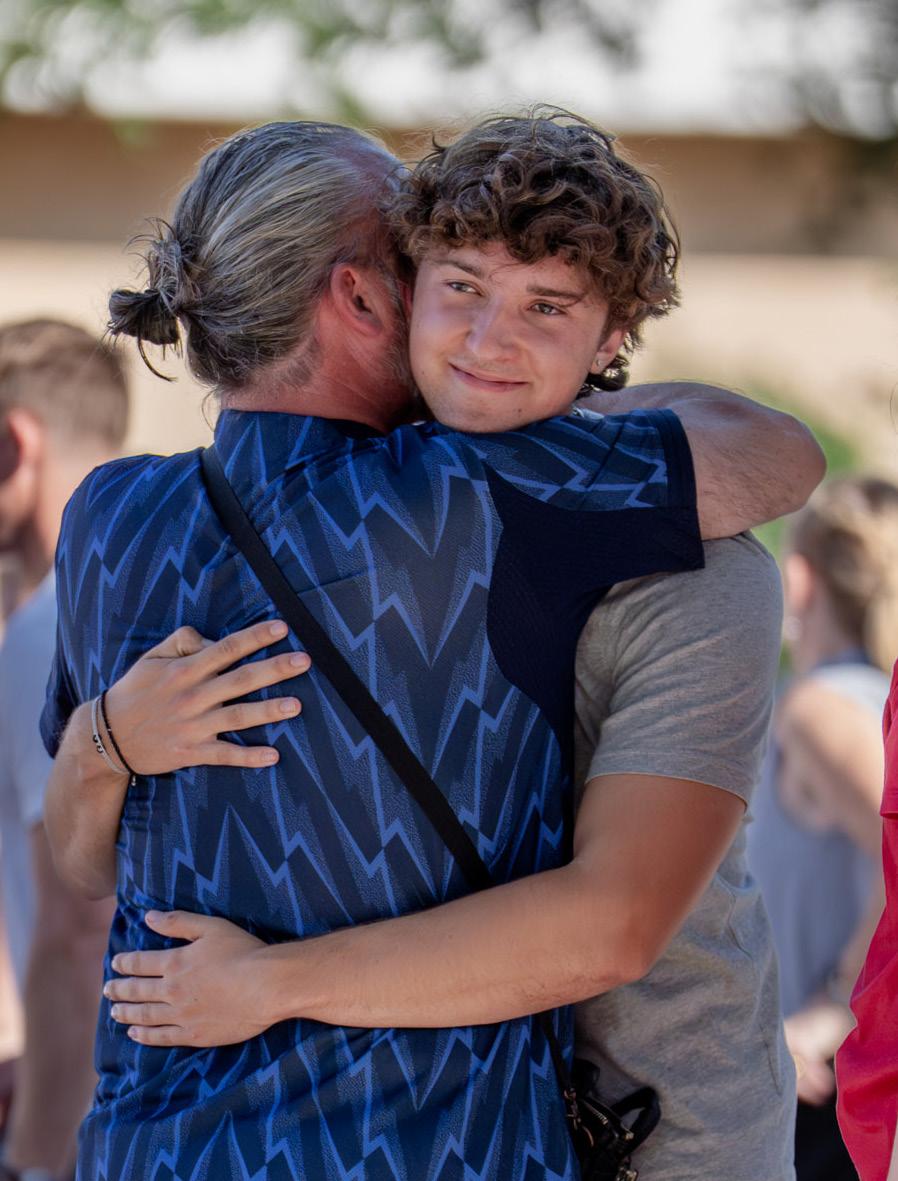


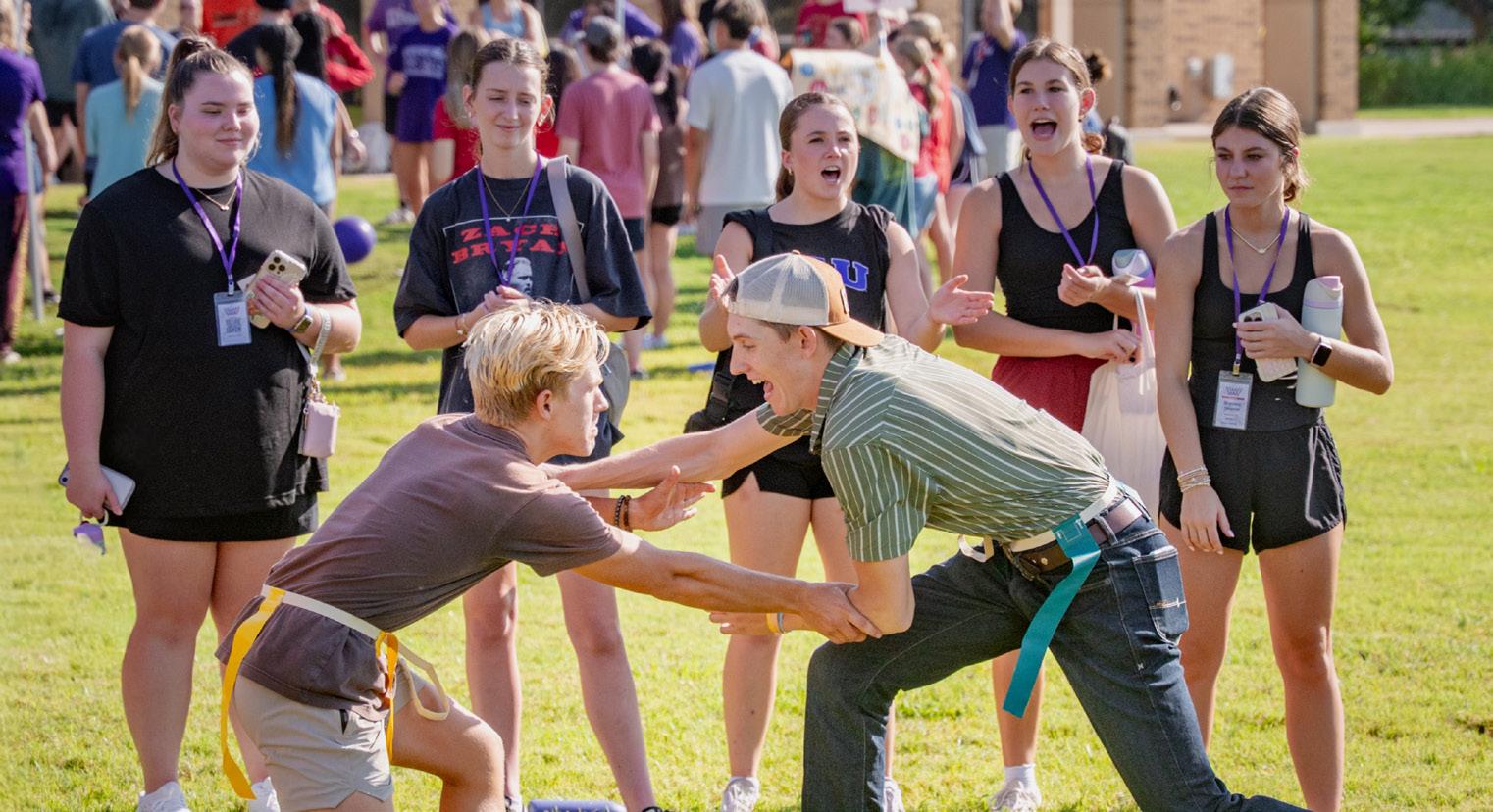
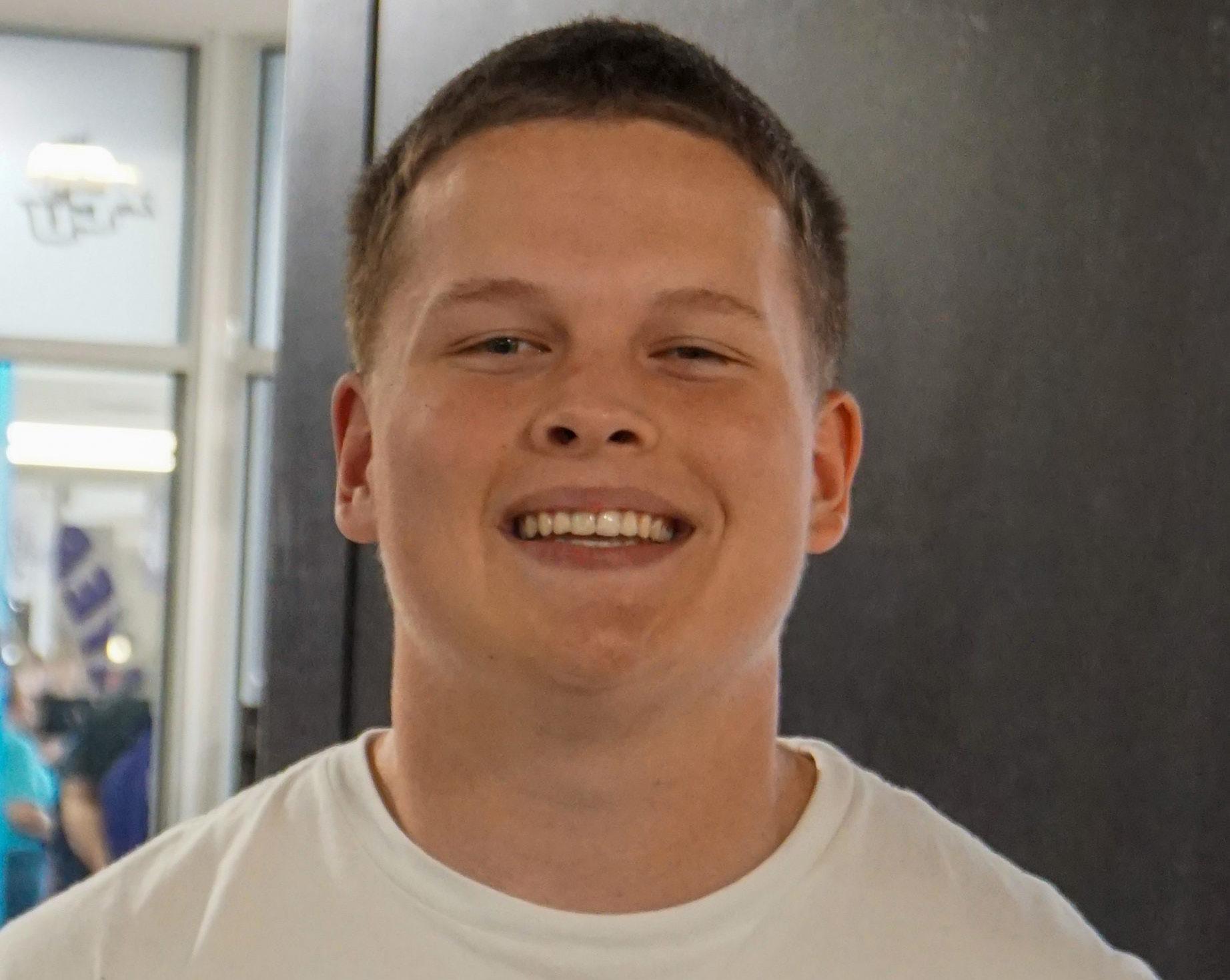
BY DANIEL CURD CHIEF PHOTOGRAPHER
VICTORIA CORREA
BY DANIEL CURD CHIEF PHOTOGRAPHER
A new student hugs his family members outside of Moody Coliseum after the Goodbye Blessing.
BY CALLIE BRIMBERRY PHOTOGRAPHER
family wraps their arms around each other while singing “The Lord Bless You and Keep You.”
BY CALLIE BRIMBERRY | PHOTOGRAPHER
A new Wildcat summits the rock wall in the Royce and Pam Money Student Recreation and Wellness Center during free time.
BY DANIEL CURD CHIEF PHOTOGRAPHER
New students wrestle to grab each other’s flag during a game of flag tag in the Mentor Group Olympics.
BY STEVEN INFANTE PHOTOGRAPHER
Members of Group 18 cheer on their teammates during a potato sack race.


Koons brings championship experience back home
Winning has started to become the norm for Wildcat softball, which made it to the WAC postseason tournament for the first time in three years under first-year Head Coach Jo Koons. That same winning DNA stretched into the summer, as Koons was a bit busy winning a title in the big leagues.
Koons was called on by the general manager of the Talons, a team in the professional Athletes Unlimited Softball League, to serve as an assistant coach for the team, assisting on defense. The Talons competed in their inaugural year with three other teams composed of first-year players drafted from across the country.
As of now, the plan for the AUSL is to tour around the country in hopes of establishing itself before transforming into a city-based league in 2026.
With Koons on the Talons’ roster, they made history, finishing with a strong 18-6 mark and capturing the inaugural AUSL title.
“Defense makes champions,” Koons said. “We had the league’s best defense, so that was awesome.”
Although excited about the championship win, Koons said she is more excited about what she gained from the experience – knowledge.
“That was incredible, an unforgettable experience for sure,” Koons said. “Just super grateful for the opportunity, and, yeah, I learned a lot and had a lot of fun doing it.”
Part of these lessons included some insightful things to bring back to the team in Abilene, which will be valuable and important as the tide changes with 17 newcomers and only six returning players on the roster.
“They were so selfless,” Koons said. “It
Hot on the heels of the team’s first Div. I playoff victory, the Wildcats and fourth-year head coach Keith Patterson’s goals stay the same: go undefeated at home, win the conference championship and go on to play for a national championship.
“They never change,” Patterson said.
The 2024 season was one of the best in program history for the Wildcats. The team went 9-5, won the United Athletic Conference with a 7-1 record, lost just one game at Wildcat Stadium and won its first Div. I playoff game against the Northern Arizona University Lumberjacks.
“The playoff win was huge for this program and for the city of Abilene,” said linebacker Will Shaffer. “We’ve got a taste of what it takes to get to the playoffs. Now we need to just continue to work to stay there and keep going round after round.”
Shaffer, redshirt senior from Tempe, Arizona, led the defense in 2024 with 123 total tackles and secured a victory on Oct. 5 for the Wildcats with an interception off University of Central Arkansas quarterback Will McElvain.
Following the most successful season of his career, Shaffer is determined to continue his growth alongside his teammates as they prepare for the 2025 season.
“I’m just trying to do everything I can to stack days and be a leader for this team,” Shaffer said.
“We just take each day one day at a time… Just keep doing what we’re doing
wasn’t about the stats. It wasn’t about yourself and what you were doing; it was about what everyone was doing collectively to help us win.”
This type of range of experience and humility to learn from others, said Vice President of Athletic’s Zack Lassiter, was exactly why he chose Koons for the job just over a year ago.
“Her ability to make somebody a better softball player, but in an environment that is led with joy, love and enthusiasm around that, I think that is a unique combination,” Lassiter said. “She’s committed to being the best at improving, and that process is going to serve her and ACU well.”
Lassiter also mentioned the opportunity brought a positive bright light to ACU’s brand.
“This was an opportunity that may never come around again,” he said. “What a great platform for her to be able

to share who we are.
What a powerful story to tell young people that I am the head coach of you, but also thought of well enough in our industry to be in a position to work with the best softball players in the world.”
Koons added her time with the Talons not only enhanced her coaching eye for the game but also put into a greater gear the vision for the Wildcats moving forward.
“I think just for myself, it’s like rejuvenated, like, we can do it here,” Koons said. “And I’ve always known that, but just to be on this experience and on this side of it, I can just bring that momentum into my staff and then into our team itself.”


to keep galvanizing this football team and this defense.”
The Wildcats’ season ended on Dec. 7 with a loss to the eventual FCS Champions, North Dakota State University, by a
score of 51-31. Since the loss, the team has undergone several key changes, including an overhaul of the offense. Quarterback Maverick McIvor transferred to Western Kentucky University, leading
rusher Sam Hicks graduated, and leading receiver Blayne Taylor signed with the Indianapolis Colts. Additionally, the Wildcats graduated offensive linemen Jacob Thielen, Alan Hatten and Carson Walker, while Tay Yanta and Trent Pullen transferred to the University of North Texas and University of Memphis, respectively.
In 2025, the team will have a new look on offense under Offensive Coordinator Graham Harrell. Harrell, a College Football Hall of Famer, will take over for Rick Bowie, who accepted the offensive coordinator position at WKU. Harrell, while recognizing the significance of experience and games played as a team, is confident in the chemistry and talent of this year’s roster.
“You can’t replace the amount of reps and what
that gives you as a unit,” said Harrell. “But as camp has gone on, I think that we’ve seen the group really grow… We have a talented group, just an inexperienced and talented group.”
The new-look offense under Harrell will have a new quarterback that is still to-be-announced.
Transfers Stone Earle, redshirt senior from Marshall University, Cade Fennegan, redshirt senior from Brigham Young University, and John David Black, redshirt freshman from East Carolina University, join Quayde Hawkins, redshirt senior from Troy University, in the potential quarterback pool.
“We have some talent in that room,” Harrell said. “They’re all four very, very different people and very different players… They all bring something different to the table, but
THE OPTIMIST STAFF
I think they all have the ability to play at this level and can be really special at this level.”
The Wildcats will start the season on the road when they take on the University of Tulsa Golden Hurricane. In week two, the Wildcats will welcome Stephen F. Austin University to Abilene as they take on the former Southland Conference rival. Week three, the Wildcats will travel to Amon G. Carter Stadium and face the TCU Horned Frogs at 7 p.m. on Sept. 13. Tulsa and TCU will be the two FBS opponents the Wildcats face in addition to three pre-season ranked FCS opponents and two others that are receiving votes: Southern Utah University and Eastern Kentucky University. After the road game against TCU, the Wildcats will begin UAC play against Austin Peay State University in Abilene. After just one UAC contest, the Wildcats will get back on the road and take on the pre-season No. 5 FCS-ranked University of Incarnate Word Cardinals. After the Sept. 27 showdown, the Wildcats will play every game in conference with four of the seven remaining games on the road, including a battle in the final week of the regular season with UCA on Nov. 22.
“This is by far from top to bottom the best coaching staff I’ve had since I’ve been here,” Patterson said. “We’re all on the same page, no hidden agendas, and everyone understands who we are and here’s where we’re headed.”
PHOTO COURTESY OF JO KOONS Head softball coach Jo Koons celebrates with player after winning AUSL championship.
BY ASHLEY HENDERSON | EDITOR IN CHIEF
Will Shaffer, redshirt senior linebacker from Tempe, Arizona, tackles the Vandals running back.
BY DANIEL CURD | CHIEF PHOTOGRAPHER
Keith Patterson, head football coach, walks back to the sideline after a timeout with his players.
Out with the WAC, in with the UAC
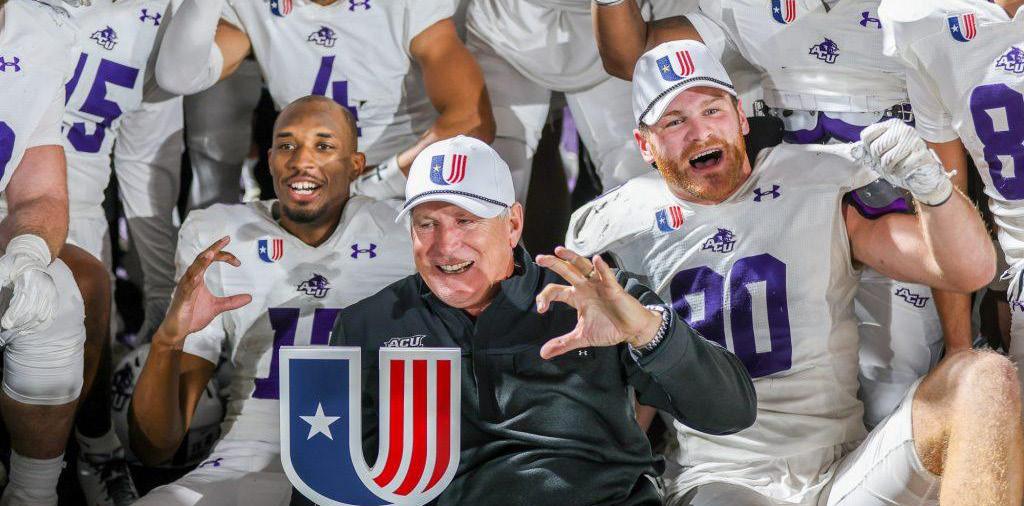
BY LINDSEY BLASINGAME SPORTS EDITOR
Beginning on July 1, 2026, the Western Athletic Conference will officially become the United Athletic Conference.
Following departures of many schools like Grand Canyon University and Southern Utah University, the WAC decided to rebrand as the UAC, which already exists as a football-only conference, but will now extend to all sports, as stated in a press release June 26.
The three remaining Texas WAC teams, Uni-
versity of Texas-Arlington, ACU and Tarleton State University, will be joined by five Atlantic Sun Conference teams in the UAC, who have been playing as a part of the football-only UAC.
Austin Peay State University, North Alabama University, Eastern Kentucky University, the University of Central Arkansas and the University of West Georgia are the five schools leaving the ASUN.
The UAC and ASUN are entering a strategic alliance that Dr. Phil
Schubert, president of the university, said will help them with recruiting and scheduling while remaining as two separate conferences.
“So you have the strength of 15 schools, if you will, that are kind of aligned philosophically and strategically, and yet you’re still able to maintain separate conferences,” he said.
The advantages of keeping the conferences separate are that they will both retain their NCAA automatic bids for tournaments such as March
Madness, and that the conferences will remain relatively small in size, allowing for easier scheduling and travel.
Zack Lassiter, vice president for athletics, said the new alignment has many benefits, including playing schools closer to home.
“Our teams are going to be able to have a more regional competition during the regular season,” he said, “which means they travel less and their friends and family can watch them play more because we’re
playing in areas where we’re generally recruiting student athletes as well.”
Schubert agreed with Lassiter and added that the closer games will benefit the athletes’ studies.
“It’s always nice to try to reduce the geographic footprint, which reduces travel costs,” he said. “It reduces student-athlete missed class time.”
Lassiter said he is very interested to see how the UAC plays out after it has been in the works for a long time.
“I think the concept in a theory was great, and now we’re going to find out in reality what it looks like,” Lassiter said. Schubert said he has high hopes this conference will last for a while and that it will be appealing to potential future programs.
“I hope that we see the growth and evolution of this conference commensurate with all of our schools continuing to play championship sports and compete at a high level and enjoy success,” he said.
New ‘competitive spirit’ drive new-look volleyball team
BY LINDSEY BLASINGAME SPORTS EDITOR
At the end of last season, volleyball fell short at the Western Athletic Conference Tournament. This year, they plan to win it all.
Head Coach Ijeoma Moronu Alstrup is entering her third season at the helm of the Wildcats and said she always prioritizes fundamentals in her coaching style, but this year’s team takes it a step further.
“We always focus more on the process,” she said. “But I think this year we’re just not afraid to say we want the win, and we’re gonna do whatever we can to do it.”
Hannah Gonzalez, junior middle blocker from Lucas, said the team has lacked a competitive drive in her previous two seasons but now sees a big difference in this year’s roster.
“We’re bought in,” Gonzalez said. “We talk about winning a WAC championship every single day. We make sure we talk about it because if you don’t talk about your goals, you’re never going to achieve them.”
The roster is more experienced than it has been in recent years, but two new freshmen have joined the team and helped increase the competitiveness. The freshmen are Aliyah Jowers, pin hitter from Abilene, and Hadlee Welch, pin hitter from Lubbock.
In addition to the new freshmen, four transfers also hope to make an impact on the team: Becca Siedenburg, senior setter transfer from Gardner-Webb, Aubrey Beaver, junior outside hitter from Cal State-Fullerton, Erika Gustafson, sophomore middle blocker from Montana State, and Brennan Ramirez,
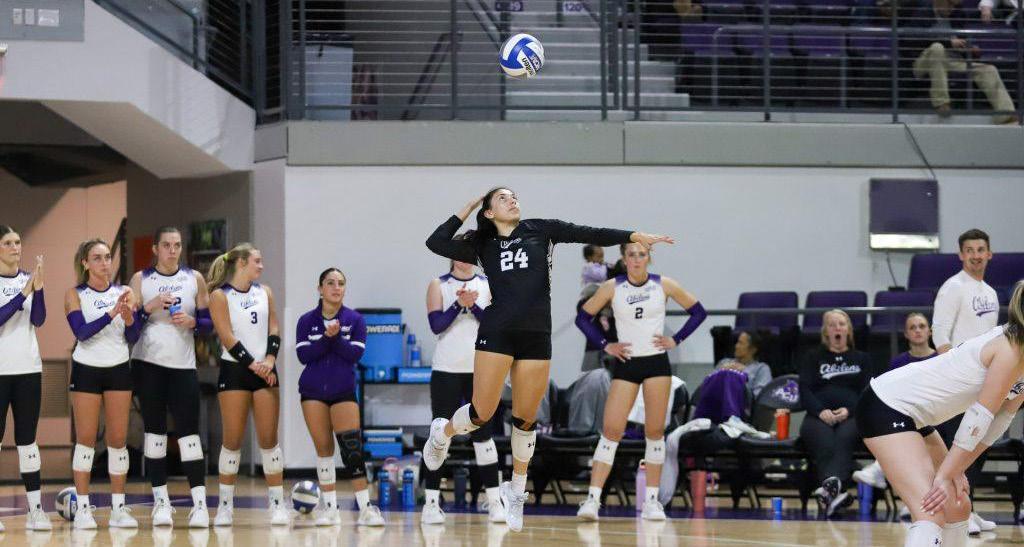
redshirt freshman libero from the University of Texas.
“A lot of them will make a big impact on the court in a lot of different ways,” Moronu Alstrup said about the new freshmen and
transfers. “But they’ve done a really good job of coming into the culture, accepting the culture and then making it better too.”
The Wildcats will open their season with a home tournament on
August 29 and 30, when they host the University of Incarnate Word, Missouri State and the University of Oklahoma.
“We’ve been driving the spirit of ‘We can be on the top, we can be a championship
team, we can be a winning team,’” Gonzalez said. “So when we play against OU, just having that mentality of ‘We are not like the underdogs. We are meant to be here and play with this level of team.’”
Salas hopes to break the tie, compete for championship
BY HAYDEN DELAND SPORTS REPORTER
After putting up a 2-78 record during the fall season and a 6-1 record in the spring season, Head Coach Stephen Salas has begun his third season coaching the soccer team.
Last season, the team tied eight times in the 17 games it played. The Wildcats failed to win a Western Athletic Conference game, posting a 0-5-2 record. That gave them the seventh spot out of eight in the standings and forced them to miss the WAC tournament by one spot. Salas wants this season to be a different story for his team.
“We’ve trained resilience, we’ve trained leadership a lot in the spring and then going into fall, and we’ve seen that,” Salas said. “No
ties so far.”
The spring featured key moments for the Wildcats, including the program’s first win against a Power Four opponent when it beat SMU. The only loss for the team was to No. 24 Texas Tech.
Through the first two games of the 2025 season, the team is 1-1 with a win against the University of Texas El Paso 1-0 and a loss against New Mexico State University 0-1. The Wildcats are scheduled to play the University of Tulsa and Houston Christian University after the time of print.
With the loss of key players Chayse Thorn and Georgia Gunther this season, other players will have to step up to fill the void. The roster features ten seniors this season, which Salas believes will ease
the loss of Thorn and Gunther.
“We have a lot of seniors this year, and so I would say that they’re my number one motivation for this year,” said Gracie Kelly, sophomore defender from Corona, California.
“This is their last year playing soccer and just to work for them and have the most successful season we can.”
Two seniors that Salas says have stepped during the spring and in the fall are Amelia Leggett, senior forward from Wylie, and Peyton Hill, redshirt junior forward from Laguna Niguel, California.
Leggett scored one goal in five shots in the two games she has started, and Hill had three shots on goal in four shots.
Salas expects Kelly to be a valuable player for
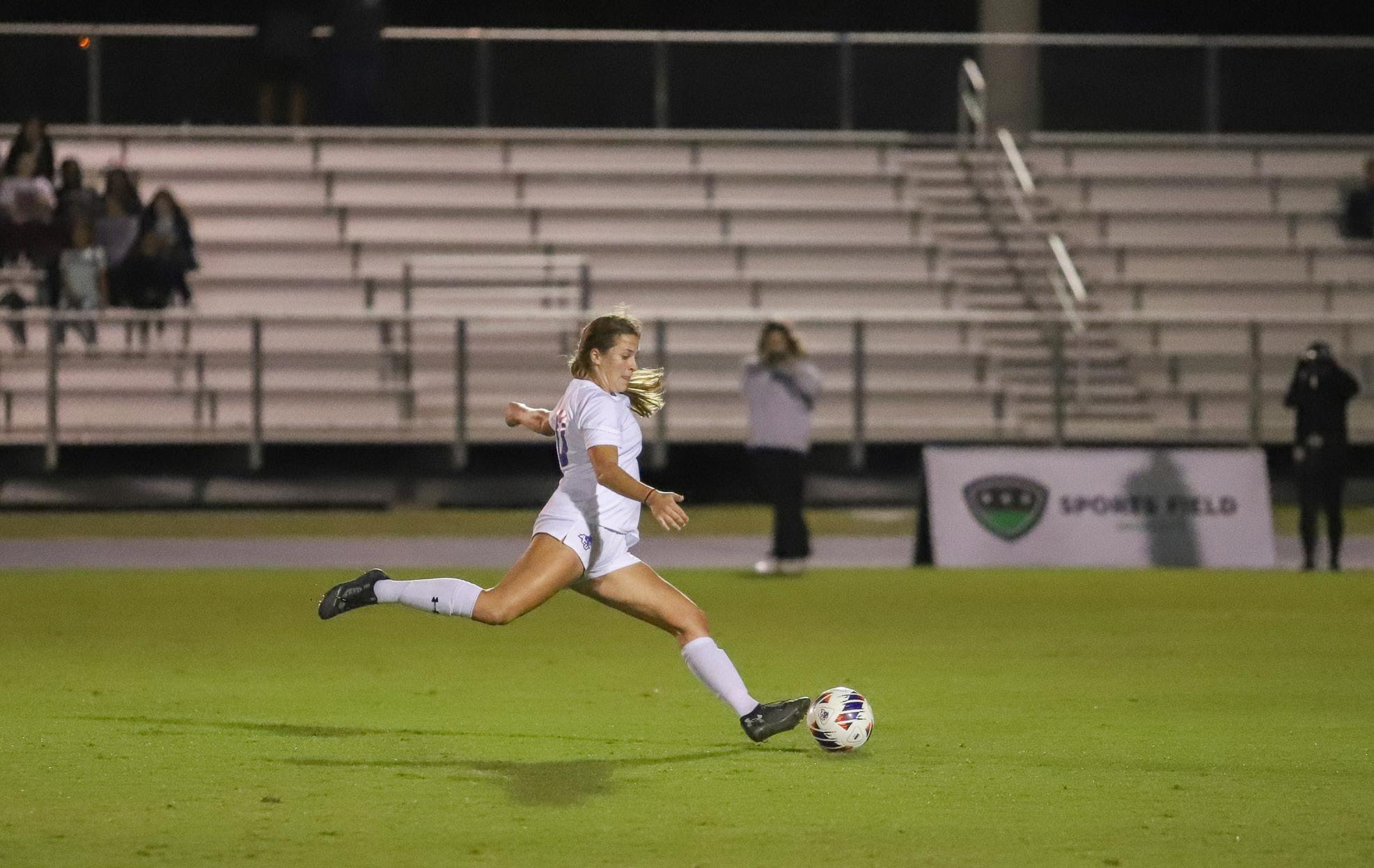
the team this year despite her only being a sophomore.
“Gracie Kelly has really stepped into her own,” he said. “She’s a center back, kind of has a chip on her shoulder, probably should’ve won freshman of the year last
year. [She] had a goalline save against UTEP, preserved the win. It was unbelievable.”
One of the key matchups for the Wildcats for this season will be against Baylor on September 14. It will be the team’s final game before
beginning conference play against California Baptist University on September 25. After a disappointing conference showing last season, Salas hopes his team is able to compete for a conference championship this season.
PHOTO BY ZION WEBB
Keith Patterson, head football coach, holds a trophy while celebrating with the team.
PHOTO BY JOHN STAI
Brennan Ramirez, redshirt freshman libero from Waxahachie, serves the ball.
PHOTO BY STEVEN INFANTE Gracie Kelly, sophomore defender from Corona, California, lines up her shot on the goal.
